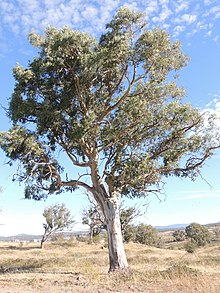Eucalyptus blakelyi
| Blakely's red gum | |
|---|---|

| |
| Eucalyptus blakelyi growing in the A.C.T. | |
| Scientific classification | |
| Kingdom: | Plantae |
| Clade: | Tracheophytes |
| Clade: | Angiosperms |
| Clade: | Eudicots |
| Clade: | Rosids |
| Order: | Myrtales |
| Family: | Myrtaceae |
| Genus: | Eucalyptus |
| Species: | E. blakelyi
|
| Binomial name | |
| Eucalyptus blakelyi | |
| Synonyms[2] | |
| |
Eucalyptus blakelyi, known as Blakely's red gum,[3] is a tree endemic to eastern Australia. It has smooth bark on its trunk and branches, dull bluish green, lance-shaped adult leaves, flower buds usually in groups of seven, white flowers and cup-shaped to hemispherical fruit.


Description
[edit]Eucalyptus blakelyi is a tree that grows to a height of 20–25 metres (66–82 ft) and forms a lignotuber. The bark on the trunk and branches is smooth, pale grey, cream-coloured and white with patches of other colours. Young plants and coppice regrowth have stems that are square in cross section and usually egg-shaped leaves 40–100 mm (1.6–3.9 in) long and 33–70 mm (1.3–2.8 in) wide with a petiole. Adult leaves are lance-shaped to curved, the same bluish green on both sides, 60–200 mm (2.4–7.9 in) long and 5–45 mm (0.2–2 in) wide on a petiole 10–25 mm (0.4–1 in) long. The flower buds are usually arranged in groups of seven but sometimes up to fifteen in leaf axils on a peduncle 5–19 mm (0.2–0.7 in) long, the individual flowers on a pedicel 1–7 mm (0.04–0.3 in) long. Mature buds are oval to spindle-shaped, 8–14 mm (0.31–0.55 in) long and 3–6 mm (0.12–0.24 in) wide with a conical to horn-shaped operculum 5–11 mm (0.20–0.43 in) long. Flowering occurs from October to December and the flowers are white. The fruit are hemispherical to compressed hemispherical, 2–5 mm (0.08–0.2 in) long and 4–8 mm (0.2–0.3 in) wide on a pedicel 1–6 mm (0.04–0.2 in) long with the valves protruding.[3][4][5][6][7][8]
Taxonomy and naming
[edit]Eucalyptus blakelyi was first formally described in 1917 by Joseph Maiden from a specimen collected in the Pilliga scrub by Harald Jensen. The description was published in A Critical Revision of the Genus Eucalyptus.[9][10] The specific epithet (blakelyi) honours Maiden's assistant, William Faris Blakely.[10]
Distribution and habitat
[edit]Blakely's red gum grows in woodland and open forest, mainly on the tablelands of New South Wales and the Australian Capital Territory but also in the far south-east of Queensland and north-eastern Victoria. It sometimes grows in seasonally waterlogged depressions but also on stony rises.[6][7]
References
[edit]- ^ Fensham, R.; Laffineur, B.; Collingwood, T. (2019). "Eucalyptus blakelyi". IUCN Red List of Threatened Species. 2019: e.T133378161A133378163. doi:10.2305/IUCN.UK.2019-3.RLTS.T133378161A133378163.en. Retrieved 18 November 2021.
- ^ a b "Eucalyptus blakelyi". Australian Plant Census. Retrieved 19 March 2019.
- ^ a b Brooker, M. Ian; Slee, Andrew V. "Eucalyptus blakelyi". Royal Botanic Gardens Victoria. Retrieved 19 March 2019.
- ^ Walker, Karen; Burrows, Geoff; McMahon, Lynne (2001). 'Bidgee bush : an identification guide to common native plant species of the south western slopes of New South Wales. Yarralumla, Australian Capital Territory: Greening Australia. p. 14. ISBN 1-875345-61-2.
- ^ Brooker, Ian; Kleinig, David (1999). Field Guide to Eucalypts (Volume 1). Bloomings Books. p. 165. ISBN 0-909605-62-9.
- ^ a b "Eucalyptus blakelyi Blakely's redgum". Euclid: Centre for Australian National Biodiversity Research. Retrieved 19 March 2019.
- ^ a b Chippendale, George M. "Eucalyptus blakelyi". Australian Biological Resources Study, Department of the Environment and Energy, Canberra. Retrieved 19 March 2019.
- ^ Hill, Ken. "Eucalyptus blakelyi". Royal Botanic Garden Sydney. Retrieved 19 March 2019.
- ^ "Eucalyptus blakelyi". APNI. Retrieved 19 March 2019.
- ^ a b Maiden, Joseph (1917). A Critical Revision of the Genus Eucalyptus (Volume 4). Sydney: Government Printer. pp. 43–46. Retrieved 19 March 2019.

